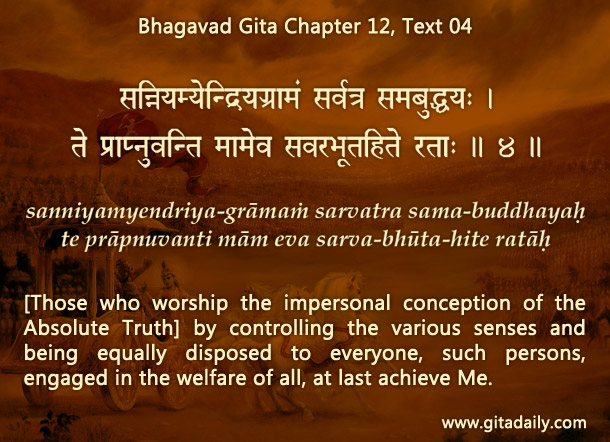An impersonal stereotype of impersonalists refers to the notion among some neophyte personalists that all impersonalists are blasphemers of Krishna.
However, the Gita itself differentiates among impersonalists. It (09.11–12) declares that those impersonalists who minimize Krishna’s form as materia, known as Mayavadis, l are deluded and ill-fated. In contrast, it (12.03–04) indicates that those impersonalists who simply seek the impersonal Absolute, without condemning the personal, known as Brahmavadis, eventually attain their desire – but only after great labor (12.05).
Many spiritualists frequently self-identify as impersonalists not due to intention but due to misinformation.
Nowadays, most people, even those who self-identify as spiritualists, are not serious seekers. Such dilettante spiritualists usually gather their spiritual conceptions from random readings or common cultural depictions. As such sources often portray that the personal manifestation is for non-intellectual sentimentalists and the impersonal for intellectuals, these fledgling spiritualists fancy themselves as impersonalists. They don’t usually have any envy towards Krishna’s personal form – to the contrary, they may even have some devotion for him. They frequently self-identify as impersonalists not due to intention but due to misinformation.
If explained properly based on Gita wisdom how the highest manifestation of the Absolute Truth is personal, such spiritualists often become personalists. We ourselves may have been such nominal impersonalists before our spiritual mentors rescued us from our misconceptions.
If we are to be similarly considerate in helping other nominal impersonalists, we need to avoid stereotyping them as blasphemers. Such stereotyping actually militates against our own philosophy. After all, personalism holds that not only Krishna but also all living beings are persons. So impersonalists are not a homogenous collective of blasphemy – they are distinct persons with individual conceptions and aspirations. By not judgmentally condemning them all as blasphemers but by cautiously yet open-mindedly offering them on a case-to-case basis opportunity for spiritual elevation, we honor our personalist philosophy and also reflect the compassionate desire of our personal Lord to benedict everyone, even impersonalists.

Explanation of article:

why there exist the two different class of impersonalist at all . since brahmavadis don’t condemn the personal form as krishna as material ,that means they accept the spiriual form of krishna as sac-cid ananda .so if they are in knowledge ,why they still hanker for merging into brahma- jyoti . the very fact that they still desire to merge into brahman indicates that they don’t accept krishna in its form as bhagavan .for brahmavadis ,often krishna’s form is transformation of brahman to make some lila in this world .for them brahman is eternal , and form of krishna is just a transformation of that eternal brahman( nirguna brahman) into human form (saguna brahman ) ,which they think to be temporary , which after the pastimes of lord is completed ,again becomes one with nirguna brahman ,becasue they don’t conceive brahman and bhagavan to exist simultaneously . i agree that they (brahmavadis) don’t consider krishna’s form to be material ,but they don’t consider krishna to be eternal either .they don’t conceive as if lord resides eternally in his spiritual world .this being the case ,how they would elevate themselves even after a great labour into vaikuntha . please explain prabhuji
They attain, with great difficulty, what they desire – that is Brahman. If they become devotees by devotee association, then they attain Bhagavan. Explained here:
http://www.thespiritualscientist.com/2014/10/arent-brahmavadis-ultimately-mayavadis-because-they-consider-the-lords-form-to-be-temporary/
ys
ccdas